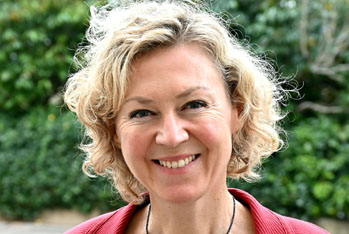Of the eight innovation trials running across local authorities in ADEPT’s SMART Places Live Labs programme, four are led by women. ADEPT chief executive Hannah Bartram talks with Brigitte Sodano-Carter (Suffolk), Carol Valentine (Kent), Louise Clayton (Staffordshire) and Sarah Bayliss (Transport for West Midlands) about their experience of working in a traditionally male, engineering-focused highways environment.

Hannah Bartram
There have been many studies into the importance of women in leadership and how it can lead to better planning and decision-making. More diversity within teams can deliver higher performance, which in a local authority context brings multiple benefits to places and our communities, so we were really pleased to see women leading half of our Live Labs projects.
We wanted to understand more about why they had chosen a career in transport, what challenges they had faced and what advice they would give others.
Transport is still an overwhelmingly male sector, so we began by discussing challenges in the workplace and whether misogyny and bias were the elephants in the room. I asked if they had experienced any strong reactions to being a female leader. The replies were varied, but all agreed they had experienced some challenging behaviour: some had faced suspicion, but had built trust and allies over time. Being the only female in a meeting was not uncommon.
Some felt there were times when they had not been given the same opportunities as their male colleagues, although this was often difficult to pinpoint. From being called ‘darling’ to ‘mansplaining’, being expected to make coffee or take the minutes, they had all been treated and perceived differently. However, they also felt that male colleagues had a growing awareness of the impact of these ‘micro-aggressive’ behaviours on female colleagues, and that this in itself was helping to bring about change.
They agreed that the balance is shifting, with more women in senior positions – just not quickly enough. The transport sector needs more female decision-makers, so having a high number of project leads on the Live Labs programme should reflect the norm rather than the exception. The question is, how do we get there?
Everyone agreed that recruitment is key. Part of the reason change is slow is because we have had a stable workforce, but more, and different, opportunities are opening up. We need to identify barriers and look at how to attract women into the sector, retain them and encourage them to apply for senior roles. Unconscious bias is undoubtably an issue – people recruiting in their like – but we also need to attract more people in the first place.
Generally, we find it difficult to attract younger generations into the council workforce despite there being a huge variety of roles. If we can do this, the problem will, in part, be resolved.
The group also discussed what change they would like to see in their working environment. Aside from having more female leaders, the group agreed that new approaches to flexible working – which the pandemic demonstrated could work well – should be embedded and accepted. We need to ensure that we provide training, and a variety of mentoring and networking opportunities, at the start of a career. This is something that we are considering introducing at ADEPT, to complement our other leadership programmes.
Despite the challenges, the women genuinely love their careers. Although from the outside the transport, sector might not look the most interesting, they all agreed that their roles are exciting and hugely varied, providing the chance to make a real difference.
Being the Live Lab project leads has provided an amazing opportunity to pilot innovative solutions around new technology and work collaboratively to weave this into everyday lives. The sector isn’t just about cars, but about active travel, innovation, aspiration and behaviour change. It is also a real way to get involved with solving the climate crisis.
I asked what they would say to women starting out in transport: ‘Be brave, be honest – be part of a growing movement for the better’; ‘just do it, don’t worry about it – you can make a real difference’ and ‘be the change that you want to be’.
We all felt it was a hugely empowering session that gave a real insight not only into the challenges faced by women in transport and how important it is to embed female leadership into organisations, but it also highlighted the variety, excitement and opportunities offered by such a richly rewarding career.
The ADEPT SMART Places Programme is a five-year project examining and developing innovation to enable the adoption of new technology across the local network. It has been developed with partners: SNC-Lavalin’s Atkins business, EY, Kier, 02, Ringway and WSP. For more information on the project, visit: www.adeptnet.org.uk/livelabs
Sarah Bayliss was the lead for one element of the Transport for West Midlands programme.
More information about ADEPT can be found at adeptnet.org.uk.
.
Register now for full access
Register just once to get unrestricted, real-time coverage of the issues and challenges facing UK transport and highways engineers.
Full website content includes the latest news, exclusive commentary from leading industry figures and detailed topical analysis of the highways, transportation, environment and place-shaping sectors.
Use the link below to register your details for full, free access.
Already a registered? Login